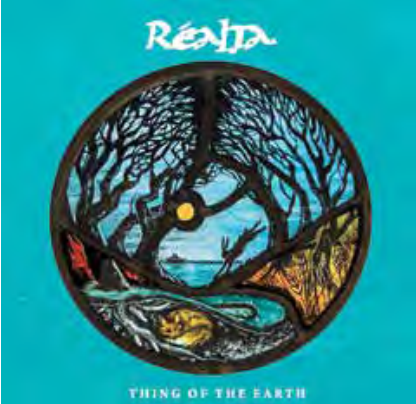March 12, 2024

Quite a journey for this Belfast band, which started out more than a decade ago as a trio with uilleann pipers Conor Lamb and Aaron O’Hagan – both also playing whistle and flute – and guitarist and vocalist Deirdre Galway. By the release of their second album, “Clear Skies” (2016), they’d expanded to a quintet with Dermot Mulholland (bouzouki, double bass, tenor banjo, vocals) and Dermot Moynagh (bodhran, percussion), and their full-bodied sound – reflecting a self-proclaimed reverence for Irish folk revival masters like Planxty and the Bothy Band – made a very favorable impression well beyond Ireland. In fact, the band appeared locally at the Irish Culture Centre of Greater Boston in 2019.
Since then, Breton native Loïc Bléjean has replaced O’Hagan on uilleann pipes and other wind instruments. And for this album, Réalta brought in Belfast guitarist/mandolinist and singer-songwriter Myles McCormack as a guest star. In addition to a few appearances on mandolin, he leads three of the album’s four songs, including its title track, which he wrote and recorded on his 2023 album “To Better All Things.” It’s not as off-the-wall a move as one might assume, because while McCormack is decidedly contemporary-minded in his influences, he’s been involved in the traditional music scene as well, and so his presence complements rather than complicates the proceedings.
Certainly, the band’s instrumental sets are as tight, animated and enthralling as ever. Whether in unison or harmony, the dual pipes make for a potent combo, the rhythm from Galway and Mulholland is solid and shrewdly deployed, while Moynagh’s bodhran often lends an infectious rock-n-roll beat, especially on “Skidoo,” written by Aussie guitarist Steve Cooney.
Mulholland also is an exceptional tenor banjo player, as he demonstrates through a set of reels that begins with his solo on Liz Carroll’s “Johnny D’s” (written not for the late, lamented Somerville music venue but guitarist John Doyle) and only gets better as the pipes join in on a pair of venerable trad tunes, “The Connaught Heifer” and “The Jolly Tinkers,” before finishing up with the joyous “Mill House,” composed by Scottish fiddler John Martin (formerly of Ossian and The Easy Club).
Lamb and Bléjean’s pipes are in the spotlight – with Moynagh lending some nifty syncopation – on a classic mixolydian jig from the repertoire of Kevin Rowsome, “Up and About in the Morning”; there’s a striking contrast with a segue into the slide “Scattery Island,” Lamb’s whistle playing over the pipes drone and joined by McCormack on mandolin and Mulholland on bouzouki; then it’s all in for another slide, “The Slippery Dip” (written by accordionist Sean Quinn) to finish out the medley.
Réalta changes up the dynamic at various times, to great effect: Galway breaks out her flatpicking skills on her medium-tempo jig “Red Rock,” while on “Fluffy’s Frolics” and “Frosty’s Frolics,” a pair of brisk slip jigs composed by Patrick Davey – one in F, the other F-minor (for those who like something beyond the D/G/Am/Em menu) – Bléjean and Lamb switch to whistles and Mulholland to double bass.
McCormack, whose voice is ingratiatingly mellow, makes his singing debut on the band’s rendition of Robert Dwyer Joyce’s oft-covered ballad “Wind That Shakes the Barley,” a lament for both a love lost and a country downtrodden. While most versions – with the notable exception of that by Solas – tend to be slow and solemn, Réalta pushes the tempo and rhythm some and in so doing creates a certain foreboding; the quite spectral harmony supplied by guest singer Cathy Jordan of Dervish is the coup de grace.
McCormack’s own material often deals with the search for meaningful connections, among people and especially with the natural world, and the barriers to those relationships – which, not surprisingly, are often put up by ourselves. As he sings on the gently plaintive title track: “Believe in yourself, believe in the Earth/Some things have worth, some thing of the Earth.”
In a similar spirit, McCormack covers none other than Bob Dylan’s “The Times They Are A-Changing,” although he alters the vibe from rabble-rouser to something more introspective – as if to suggest that the real change has to come from within (he also switches the time signature to a bluesy 4/4).
The fourth song is a counterpoint of sorts to the other three, the nostalgic if somewhat bittersweet “Mulroy Bay,” popularized by showband singer John Kerr and said to have been written by Hugh Friel of Donegal. Mulholland takes the lead vocals with some winsome pipes and whistle, and Galway’s fine piano backing and harmony singing.
This might all seem a pretty unwieldy mix for one album, but nothing on “Thing of the Earth” feels like an overreach or underachievement, thanks to Réalta’s excellent musicianship and canny arrangements. They continue to fulfill the promise shown back in the 2010s.

